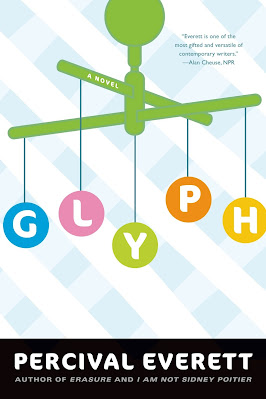“Percival Everett by Virgil Russell” by Percival Everett:
This is my fifth book by Percival Everett and all his other books so far I have immensely enjoyed, they all were great, entertaining stories and were, if not by their topics, then by their style, quite easy to digest. Statistically there had to come the moment where I might stumble upon a book by him a little bit more demanding. Well, this one is it.
That is not to say I don’t like it. I do, I really do. It is just very different from what I expected.
It is a comedy, it has fantastic elements, it is very confusing at first, it has many narrative strands and one really has a hard time to figure out what’s going on, who exactly the narrator is and where this all will be leading at. It is a story inside a story inside a story.
The whole thing is offered in a relaxed voice, spiced often with Percival Everett‘s trademark of deadpan comedy and wordplay. It is a very intellectual and philosophical novel, not really plot-driven. Mostly we find us in the mindset of some person, the narrator, who is either Dad or Son. There are natural transitions from one mind state to the next, without it being clear what mind exactly we are in at the moment, there is no reliability, no one to trust, once a statement or a fact is uttered, the next moment it will be renounced. There is an unconventional mixture of different styles that gives the work a distinctive air. It sometimes frightens, sometimes upsets and often baffles the reader.
At some point it becomes clearer that we are following an old man’s mind, a dying man’s mind, who passes his last days in an old peoples institution called Teufelsdröckh. The little plot that gives the story momentum comes from sketching the every day life at such an institution, fellow senile residents and mean-spirited orderlies and nurses and a mild insurgent of the old people against their oppressors included.
The old man is or was a writer (or photographer?, or horse trainer?, or doctor?) and in his mind entertains conversations with a (perhaps) dead son, or it is vice versa. Or the son lives. Be it as it may, they both seem to wish to reconnect, the father and the son. The old man, having lived quite a life, is a wise man. And so we are giving snippets and snatches of memory, short flashbacks into the past, encounters and historical events known and unknown, we are following someone’s life which could easily be our own. Or not.
I think, I assume, I imagine this novel to be an attempt at giving a home, a contextual ground for contradiction and irreconcilabilties. Many ideas and concepts, many soft blossoming beginnings of narratives are laid down as rhizomes and the reader allows them to either flourish or wither. So there might also be the intentionally and wanted participation of the reader as another factor in the development of the novel.
The desire to express oneself artistically, say as, a painter or writer or composer, stems from the attempt to move beyond the base and vulgar, purely animal, and very short existence on this planet. To a certain degree, it varies from individual to individual, the artist reaches a point were he realises to have said all there is to say, all there is to express. This is a tremendous shift in perspective on life itself. As it is for non-artists who reached the same conclusion. Everything after that revelatory moment, everything else must be regarded as gloss, as repetition, embellishment, elucidation or reissue, in other words, it is redundant.
So, how do we go on living with this knowledge? What do we make of it? The only new thing left to us is cessation, suspension, conclusion, preferably conclusion with a promising enticing solution. We are left to play with and within tenebrous shadows of memories. Some call it redemption.
A very good book. A wise book. It is about language, about writing, it is an investigation into the nature of narrative, it is a play on self-reference, it is about concepts and ideas, about reliance and truth, it is philosophical. It is about a life, about the absurdity and incongruity of life. It is a strong, compassionate meditation on old age and its humiliations. And about dying. And about living.
#robertfaeth, #painterinBerlin, #painting, #art, #bookblog, #bookreviews, #literaturelover, #poem, #poetry


















